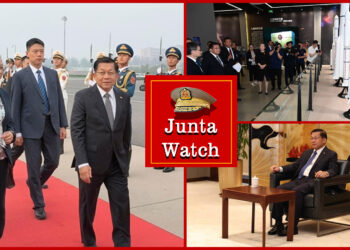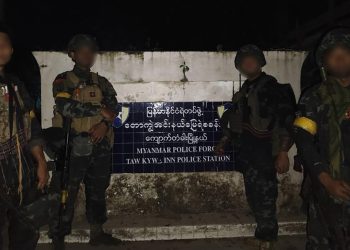PATHEIN — As the November election draws near, the Irrawaddy Delta is abuzz with public rallies, candidates meeting with voters in far flung villages, and flatbed trucks blaring campaign songs as they amble down dusty streets. Yet in Irrawaddy Division’s numerous military cantonments, home to tens of thousands of voters, not a single candidate has come to canvass support from the thousands of service personnel based in the area.
Those contesting the election say they have been unable to secure permission from the military hierarchy to visit the bases. The military itself is unwilling to allow access to candidates, out of concern that campaigners might disparage the Burma Armed Forces. For opposition parties, devoting time to campaigning on military bases seems counterproductive, as many have already concluded that soldiers and their families will vote en bloc for the ruling Union Solidarity and Development Party (USDP).
More than 20,000 service personnel are based in Irrawaddy Division, half of whom are attached to the South Western Command headquarters in divisional capital Pathein, with the rest garrisoned in locations spread across seven other Delta townships.
Though voter lists for soldiers and their families have been put on display in the division’s cantonments, they have yet to be provided to the divisional office of the Union Election Commission (UEC), and the exact number of eligible voters in each base is unknown.
More than a month after the campaign period commenced on Sept. 8, not a single political party has applied for permission to stage a rally in the cantonments, according to the Irrawaddy UEC office.
Than Win, a Lower House candidate contesting the seat of Pathein for the Democratic Party for a New Society (DPNS), told The Irrawaddy that he had decided not to visit the South Western Command headquarters because it would have been too difficult to gain official access.
“I decided not to go there because I would likely not be permitted to enter, even if I asked,” he said.
Understanding the Military
Even if political parties sought permission from the UEC, it is unlikely that battalion commanders would allow access to cantonments. Candidates who competed in the Pathein by-election in 2012 were prevented from holding rallies in the South Western Command and an officer based there said he believed the situation had not changed.
“I don’t think the military would allow the rally because leaders are concerned that campaign speeches may include bad things about the military,” he said.
Earlier this year, Snr-Gen Min Aung Hlaing, the commander-in-chief of the Burma Armed Forces, called on service personnel to cast votes for those candidates who “understand” the military. Opposition candidates in Pathein have interpreted his comments as an endorsement of the USDP.
They are afraid that something bad will happen to their husbands if it is found that they have cast a vote for another party.”
The incumbent party can expect solid support from military personnel in the Delta. The Irrawaddy asked numerous people attached to the South Western Command who they would vote for in the coming election. All said they would cast a ballot for the USDP, though not all will do so willingly.
“I’ll cast vote for the USDP, but not because I like it. I’ll cast vote according to the wishes of the (military) leaders,” the wife of a soldier told The Irrawaddy.
Though the National League for Democracy (NLD) won the 2012 Pathein by-election resoundingly, military polling stations in the township overwhelmingly returned ballots in support of the USDP. A local soldier told The Irrawaddy that an investigation was launched after the poll to determine who had cast the few votes for the opposition party.
Fear of Retribution
Another soldier, recently discharged from a battalion from the South Western Command, said that fear of retribution for going against the military hierarchy loomed large over the poll, despite a promise from UEC divisional chairman Aung Myint that ballot papers would remain secret.
“Around 90 percent of all the people in our battalion are afraid. “Most of them like Aunty Suu’s NLD,” he said, referring to opposition leader Aung San Suu Kyi. “But they dare not say no if leaders (say to support) the USDP. They have fear.”
Military officers and corporals trained by the Union Election Commission (UEC) will serve as presiding officers at cantonment polling stations. Battalion commanders have instructed the families of service personnel who live outside military bases to cast their votes at cantonment polling stations, said a retired major.
“There is an instruction that family members of service personnel living outside the cantonments in Pathein have to cast their vote in those cantonments,” he told The Irrawaddy. “Most of them can’t go against it. They will cast their votes for the USDP, which the military favors. They are afraid that something bad will happen to their husbands if it is found that they have cast a vote for another party.”
Candidates from both the DPNS and NLD have alleged that some officers have sought voter list identification numbers belonging to the family members of soldiers, saying they would cast advance votes on their behalf.
“When we went to Poe Shwe Mya Gon village for a rally, the family member of a soldier told us that we could not get her vote, as the battalion had already collected advance votes from them,” said Than Win, a DPNS candidate for the Lower House.
A total of 10 political parties will be competing in Pathein, but most will not have enough staff to scrutinize the vote at military polling stations. The NLD, which is expected to make massive gains in November, has said it will monitor cantonments on election day to ensure the vote is conducted fairly.
Wai Hlaing Tun, the NLD’s candidate for the Lower House seat of Pathein, said he was scheduled to campaign in cantonments at the end of October, but it remained unclear whether the party would be permitted to do so. The party has yet to seek permission from the UEC.
“We don’t know what difficulties we will encounter yet,” he said.

















